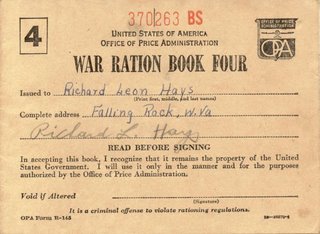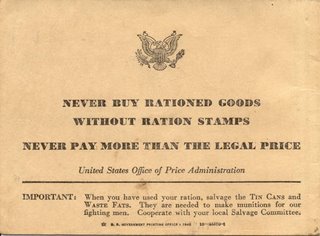

Jonah Goldberg’s recent column gives an elegant, face saving plan for retreat in Iraq.
If that’s what you are aiming for.
Goldberg's plan:
. . . I think we should ask the Iraqis to vote on whether U.S. troops should stay.
Polling suggests that they want us to go. But polling absent consequences is a form of protest. With accountability, minds may change and appreciation for the U.S. presence might grow.
If Iraqis voted “stay,” we’d have a mandate to do what’s necessary to win, and our ideals would be reaffirmed. If they voted “go,” our values would also be reaffirmed, and we could leave with honor. And pretty much everyone would have to accept democracy as the only legitimate expression of national will.
If we do use the Goldberg plan, give it a little while, and we can recycle it for an elegant, face saving plan to leave Afghanistan--and any other area where terrorists cause violence (like the Europe of Spain and Britain).
Goldberg and some other conservatives seem to forget the reason we are in Iraq as well as Afghanistan.
Do you remember? Afghanistan had Al Qaeda training camps. President Bush said not only would we go after Al Qaeda but after anyone who harbored Al Qaeda. We were going to take the fight to the places where Al Qaeda (and others like them) were--not just wait until they attacked before we responded.
So, is Goldberg saying that the effort to take out their bases before they strike in the US is not a good plan?
To be fair Goldberg gives an out. If the Iraqi people vote that they want us to stay, we will stay. It will be a publicity coup. Though how that will change even publicity for other than the few months any poll is good for he doesn’t say.
Goldberg assumes that we are in Iraq primarily for the benefit of Iraqis. So, of course, if they don’t think the present plan is good, we should leave.
But, aren’t we there primarily for our benefit?
Like occupying Japan after WWII. We did try to benefit Japan. We helped them frame a democratic form of government and get their society and economy started again. But, we weren’t there primarily to help the Japanese. That’s why we didn’t run a plebiscite in Japan on whether they wanted us to stay or not. We were there to help them restructure so that they wouldn’t be a threat to us (or to the rest of Asia). It has worked for six decades and looks like it may go a bit longer.
Worked in Germany too.
Granted it may not work in Iraq. Or Afghanistan. We may have to resort to the Derbyshire model of “smack and run”. But does the price we have paid so far in dead and wounded Americans show that we have made the wrong choice?
In World War II we lost over 400,000 military (mostly men) who never got the chance to live a post-war life, not to mention the 670,000 wounded. That’s over a million casualties.
Why were Americans, both average citizens and leaders, willing to pay that high price? Because Japan and Germany were imminent threats to take over the U.S.? No, it was because they were long term threats.
The WWII generation believed that immense sacrifice against those able to carry out even a relatively small long distance hit (more died in 9/11 than at Pearl Harbor) was worth the price of more than a million men dead or wounded--not to mention the massive disruption of society by the draft, rationing and turning industrial output from domestic products to war materials. In WWII everything in U.S. society was focused on winning the war at whatever cost.
Jonah Goldberg believes the cost in Iraq has been too high:
The failure to find weapons of mass destruction is a side issue. The WMD fiasco was a global intelligence failure, but calling Saddam Hussein’s bluff after 9/11 was the right thing to do. Washington’s more important intelligence failure lay in underestimating what would be required to rebuild and restore post-Hussein Iraq. The White House did not anticipate a low-intensity civil war in Iraq, never planned for it and would not have deemed it in the U.S. interest to pay this high a price in prestige, treasure and, of course, lives.
If 2,700 military deaths in Iraq are enough to make us blink (the last time it was a bit under 60,000 for Viet Nam), our problem will not be the high price of security. It will be the lack of vision on the part of political leaders, the media and pundits like Jonah Goldberg about how important it is to avert a terrorist threat.
Fortress America was passé even in the 1940's. It’s insanity in the nuclear age.

No comments:
Post a Comment